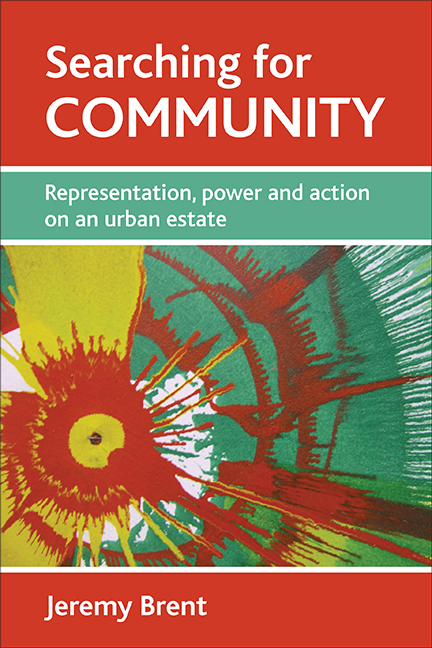Book contents
- Frontmatter
- Contents
- Foreword
- Notes on the author
- Introduction
- one Four settings: contexts and questions
- two Researching Southmead: problems of representation and participation
- three The intelligent outsider? Official and media representations of Southmead
- four Knowledge from within: community art and local representations
- five The outsider within: crossing worlds
- six Young people and community: trouble and tribes
- seven Four examples of community action in Southmead
- eight What is community anyway?
- nine Engaging with community
- ten Communicating what youth work achieves: the smile and the arch
- Author’s acknowledgements
- Epilogue: Southmead eight years on
- Afterword: Why Jeremy Brent’s work is more relevant than ever
- Bibliography
- Index
one - Four settings: contexts and questions
Published online by Cambridge University Press: 22 January 2022
- Frontmatter
- Contents
- Foreword
- Notes on the author
- Introduction
- one Four settings: contexts and questions
- two Researching Southmead: problems of representation and participation
- three The intelligent outsider? Official and media representations of Southmead
- four Knowledge from within: community art and local representations
- five The outsider within: crossing worlds
- six Young people and community: trouble and tribes
- seven Four examples of community action in Southmead
- eight What is community anyway?
- nine Engaging with community
- ten Communicating what youth work achieves: the smile and the arch
- Author’s acknowledgements
- Epilogue: Southmead eight years on
- Afterword: Why Jeremy Brent’s work is more relevant than ever
- Bibliography
- Index
Summary
Introduction
This book is a search for a way to understand and engage with community, both in general, and specifically in Southmead, a housing estate in north Bristol. This search has grown out of four settings, which together provide the book with its context, its subject matter and its concerns. The settings run as themes throughout the narrative, each with its own relevance, and are as follows: Southmead itself, a place where discourses of community run strong; my own long-term involvement as a youth worker in the area; young people in Southmead; and ideas of community, all sorts of ideas of community, popular, professional and theoretical. These settings form the basis of the book, interweaving with each other in its descriptions, analyses and findings.
First, I have to make a statement as to what the book is not. It is not a judgement on Southmead, or on the people that live there. The importance I attach to this statement, and why I feel it is so necessary to make it, will become increasingly apparent as the book continues. For now, I will leave it to the words of local activist, Les Palmer:
For years and years we have had people coming in from outside to find out what's wrong with us, how we live, and what makes us so criminal.
I do not intend my approach to Southmead to be that of the urban planner visiting a shanty town in Patrick Chamoiseau's novel, Texaco – ‘this strange visitor was coming to question the usefulness of our insalubrious existence’ – a phrase that captures the tone of enquiry from which people in poor areas all over the world, including Southmead, suffer. A major part of the book will be taken up with looking at such enquiries, the writings and surveys that Les Palmer was referring to that share that tone, and the questions they raise of the way they represent and problematise Southmead.
My concern about my approach is, of course, meaningless to those who have no knowledge of Southmead or its ‘reputation’, so before going on to look at what the book is about, let me first flesh out those four settings and the relationships between them, to give some idea of the issues involved.
- Type
- Chapter
- Information
- Searching for CommunityRepresentation, Power and Action on an Urban Estate, pp. 11 - 32Publisher: Bristol University PressPrint publication year: 2009



